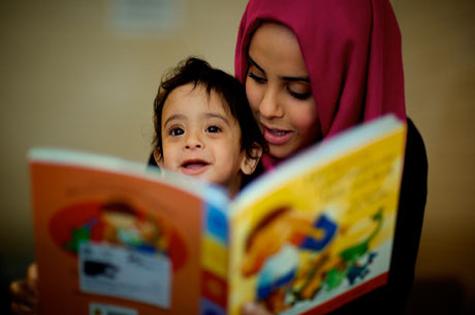There is universal agreement that reading to babies from birth has a positive influence on children’s intellectual, social and emotional development. There are those who believe that even reading to babies in the womb is beneficial!
Reading to babies well before they understand the words provides a warm bonding experience that associates books and reading with pleasure. Parents’ voices are the most reassuring sounds for a new-born baby and cradling an infant and reading in the first few months, gives the baby a sense of stability and security.
There is a wealth of research to show that children who are read to from birth arrive at school a year ahead of their peers, and maintain an advantage throughout their schooling.
Reading aloud develops a child’s vocabulary and deepens comprehension. Both fiction and non-fiction are important, through fiction children develop empathy and learn about relating to others. Through non-fiction they learn about how things work and the wonders of nature.
Each stage in the early years requires a different approach and a new selection of books. Here are my top tips for how to approach reading with babies, toddlers and pre-schoolers, as well as my recommended reads in each age group.
Reading to babies
- Hold babies close, with the book around 20cm from the baby’s face
- Use an expressive voice; speak slowly and clearly enunciating each syllable
- Choose repetitive text and repeat books, as familiar stories are reassuring
- Pick cloth, cardboard and plastic books as babies love to handle and chew books
- Follow your baby’s lead and never force!
- Sing lots of songs and rhymes
My favourite books for babies
- Dear Zooby Rod Campbell
- Time for Bed by Mem Fox
- Brown Bear Brown Bear by Bill Martin Jr
- Peepo by Janet and Allan Ahlberg
- From Head to Toe by Eric Carle
Reading to toddlers
- Encourage children to interact, turning pages, lifting flaps etc.
- Point to pictures and ask questions as you read
- Talk before, during and after reading
- Let your toddler choose the books you read
- Ask open-ended questions that require more than a ‘yes or no’ answer
- Make up your own stories about the family
My favourite books for toddlers
- Let’s Go Visiting by Sue Williams
- We’re Going on a Bear Hunt by Michael Rosen
- Alexander’s Outing by Pamela Allen
- Mr Gumpy’s Outing by John Burningham
- Owl Babies by Martin Waddell
Reading to pre-schoolers
- Continue reading books with repetitive, rhyming text
- Read folk and fairy stories
- Include poetry and rhymes
- Display an alphabet chart and talk about print in letters, signs etc.
- Scribe for your child and write his or her story, encourage your child to write
- Celebrate memorisation, it’s an important step towards reading
My favourite books for pre-schoolers
- The Tiger Who Came to Tea by Judith Kerr
- Who Sank the Boat by Pamela Allen
- Where the Wild Things Are by Maurice Sendak
- The Tale of Mr Jeremy Fisher by Beatrix Potter
- Possum Magic by Mem Fox
Talking before, during and after reading is as important as the reading itself.
Through sharing books and discussion, family values and social skills can be reinforced. By making reading together a priority, reading and discussion become a part of family life, and as children encounter the inevitable ‘ups and downs’ of life, situations in literature can help clarify their thinking.
In an ideal world, every child would come across ‘enabling adults’ to introduce them to books and writers. These family members, teachers, friends or librarians have a powerful influence on children’s confidence and skill with reading. Sadly, there are children for whom nobody plays this important role and they struggle with literacy throughout schooling and in life.
Parents are their child’s first educators. It is in these early years that habits are formed and attitudes shaped. By being a positive role model and making each read-aloud session enjoyable, children grow up seeing books and reading as a source of pleasure.
I am not an advocate for the ‘teach your baby to read’ approach. Babies don’t need to learn to read; they need to be read to. Attempting to teach young children to read before they are ready can lead to frustration and the child being turned off reading.
Throughout my teaching career, the greatest problem I have encountered is not a lack of reading skills, but a lack of motivation, ‘can read but doesn’t read’. The greatest contribution parents can make to ensure reading success, is to enthuse and inspire children with a life-long love of books and reading.
My best tips for reading success
- Read colourful, simple books from birth
- Read together every day
- Be positive about books and reading
- Give books as gifts
- Visit the library
- Serialise favourite stories
- Make books together
- Encourage children to write
- Read with enthusiasm and love!








 Agree (0)
Agree (0) Disagree (
Disagree (











__small.png)










